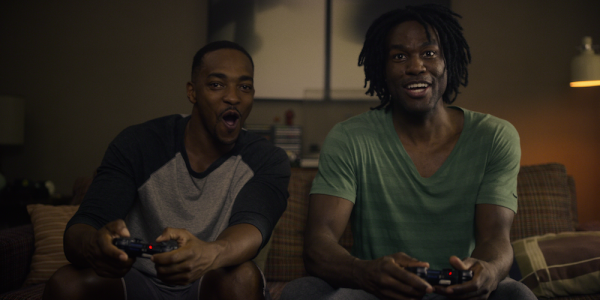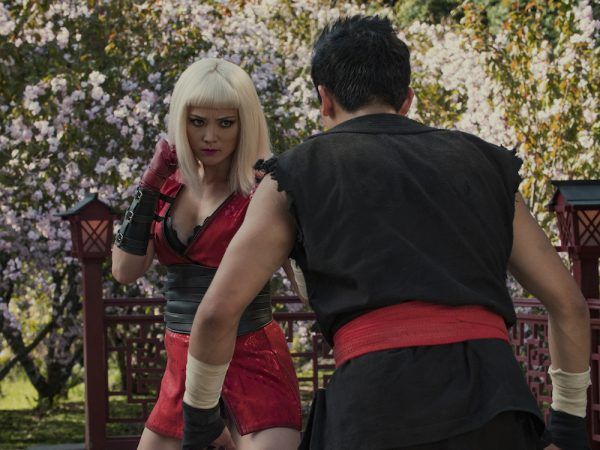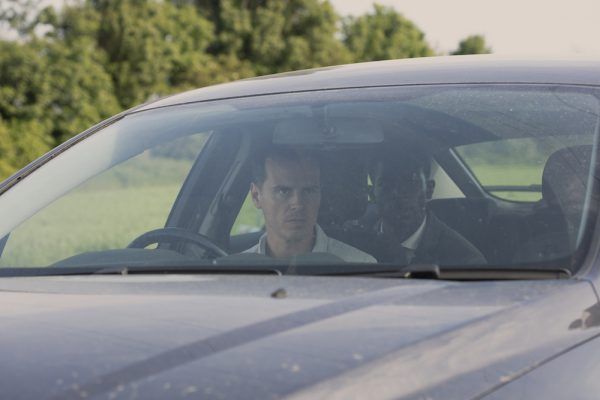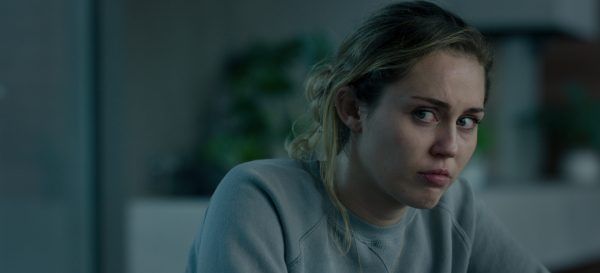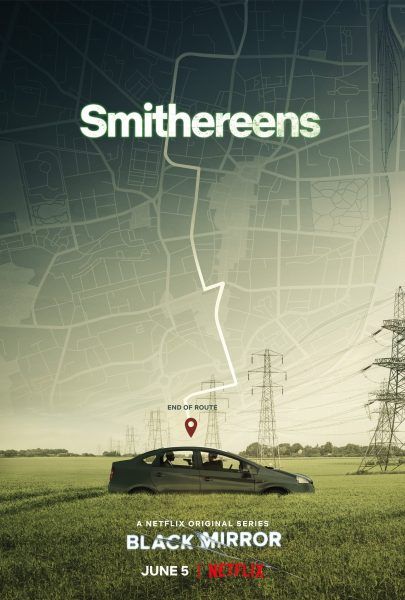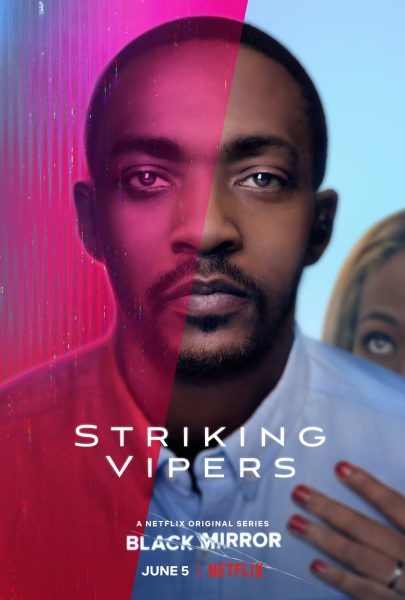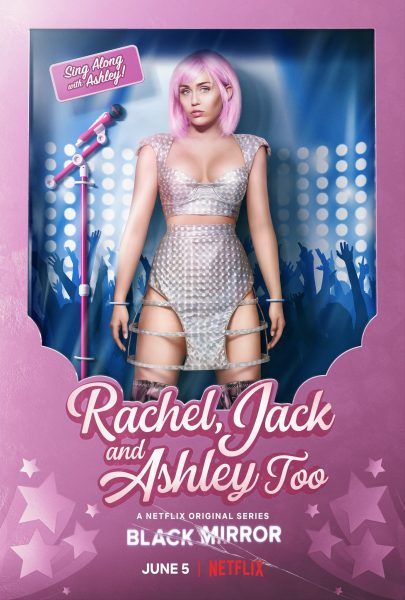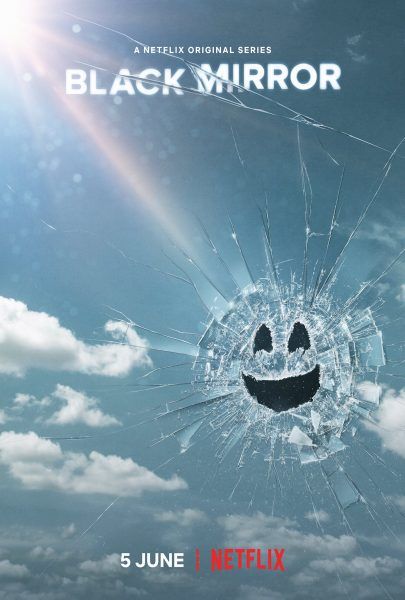Be aware some minor spoilers are necessary to discuss the episodes, but I tried to avoid any major reveals and all the endings. That said, if you want to go in 100% clean, circle back to this review after you've seen Season 5!
For almost ten years, Black Mirror has been the benchmark for tech-fuelled anxiety. Series creator Charlie Brooker and longtime collaborator/EP Annabel Jones filled audience imaginations with dreadful ideas of skewed reality, perverted consciousness, broken families, and brutalized bodies; all brought about by rapid technological advancements that often bring out the worst in humanity, leaving empathy and intimacy in their wake.
Like most great science fiction, Black Mirror proved devastatingly prophetic in the worst ways – 'The Waldo Moment', once considered among the show’s worst, now holds up as one of the most relevant (if still not among the most entertaining). But how can the show and its creators keep their edge, when the implications of technological development in the real-world keep outpacing them? If the newly released Season 5 is any indication, it can't. But that doesn't mean it can't still deliver some of the most inventive sci-fi on TV.
For its fifth season, Black Mirror reverts back to its old-school three-episode run, a decision inspired by the time-consuming demands of their interactive experiment 'Bandersnatch', which was originally intended as the fourth episode in Season 5. However, that return to series-length doesn't represent a return to tone, nor to potency. Each episode here runs a full hour, and that length only undermines episodes that would be better served by either tighter structuring or richer plotting.
The first episode, 'Striking Vipers', is right on the line of being something special in the way that returning director Owen Harris’ previous Black Mirror installments 'Be Right Back' and 'San Junipero' were. Both of those episodes hinged on the concept of human consciousness beyond, even after, life as we know it and explored the wonders or limitations therein. 'Striking Vipers' occupies that same philosophical space, but approaches it in a much more immediate way. Introducing a Street Fighter-esque video game called “Striking Vipers” that uses consciousness-altering technology to drop players right into the action, allowing them to feel everything that happens to their avatars, the episode seeks to explore the line between identity and avatar, and between pornography and infidelity in a world of increasingly interactive online life.
Anthony Mackie stars as Danny, a husband and father stuck in a rut, who ends up in a rather unexpected affair when his old BFF (Yahya Abdul-Mateen II) shows up for his birthday with the new VR edition of their old favorite, Striking Vipers. That night, they log on just like the old days, but their smack-talk and digital ass-kickings lead to something much more intimate when they fully embrace their avatar identities (Power Rangers star Ludi Lin plays Mackie’s in-game character, while Mateen’s character has an even more profound out-of-body experience in the form of Guardians of the Galaxy’s Pom Klementieff.) As their digital spark grows stronger, Danny’s wife Theo (Nicole Behari, giving a phenomenal performance) takes notice of her husband’s waning affections, sparking some complicated domestic drama.
‘Striking Vipers’ delivers some spectacular action and, funnily enough, an infinitely better job bringing a video game to life on screen than most feature film gaming adaptations. But the thrill of being transported inside your favorite video game is a shallow one, and unfortunately, the episode largely skirts the more interesting issues at play. What do the constructs of gender identity, race, and marriage mean inside a digital world where everything and nothing is real? For that matter, what is sex and sexuality? How do those experiences alter who you are in the real world? Where do we draw the line between who we are, who we want to be, and who we can be when everything is on the table?
They are fascinating questions and in that regard, 'Striking Vipers' is the Season 5 episode that hits closest to Black Mirror’s occasionally awe-inspiring knack for predicting the coming metaphysical crises of technical evolution. Unfortunately, Brooker’s script largely skates on the surface, content to posit deep philosophical questions without actually exploring those depths. The result is an entertaining if limited romantic drama through the perspective of digital anxiety that’s more interested in the micro experience of these three characters than the macro ramifications of what those experiences mean. It’s still an engaging, inventive hour of TV, but it lacks the big-picture insight of Black Mirror’s best.
The second episodes, ‘Smithereens’, feels most at home in the old-school Black Mirror canon. For one, it’s bleak as hell and (mostly) set in the UK. But it’s also the episode that’s most interested in that big-picture insight into how technology shapes society, and how few consequences there are for the power players controlling it all. It also boasts an absolute powerhouse performance from Andrew Scott, who’s currently riding high on the viral popularity of his turn as Hot Priest in Fleabag, delivering a wrenching turn as a man with (almost) nothing left to live for.
Scott stars as Chris, a devasted young man who is hung up on the evils of social media’s influence and accidentally ignites an international crisis when he kidnaps an employee from a Titan tech company called Smithereen. Dead set on speaking with Smithereen CEO Billy Bauer (Topher Grace, styled as a dead ringer for Twitter’s Jack Dorsey and matching Scott's tremendous performance), Chris accidentally mistakes a well-meaning intern (Damson Idris) for a company higher-up and demands that he get the big-wig on the phone tout suite. In classic Black Mirror fashion, nothing goes well, the tension mounts, and it all culminates in an emotional gut-punch that points the titular mirror back at the audience.
It’s the strongest entry in the new season, and every performer is fantastic, but the 70-minute runtime does the thin plot no favors, especially when the thematic undercurrent hinges on something far too simple to justify it. Without spoiling too much, by the episode’s end, I found myself thinking of an old gem from The Toast: “what if phones, but too much.” Smithereen pulls it off better than Season 3’s similarly-themed 'Nosedive', but unfortunately, that underlying message is one of such blunt-force obviousness, you kind of just walk away going, “Well, yeah…” There’s something of a tragedy to the fact that an episode of Black Mirror, the show that defined early 2010s technophobia, can end with a thesis that feels like a foregone conclusion. No doubt, that’s part of the point, but it never conjures fear so much as resignation.
The third and final episode of Season 5 earned the most pre-release buzz thanks to a staring role from pop superstar Miley Cyrus, playing a sort-of alt-world version of herself. ‘Rachel, Jack and Ashley Too’ sees Cyrus act her heart out as Ashley O, a Teen Dream pop princess trapped in a candy-colored pink wig and an identity built around platitudes of positivity. She’s desperate to break out of her cookie cutter role, but thanks to the influence of her overbearing manager/aunt (Susan Pourfar), Ashley feels trapped in a bedazzled cage of her own making. On the other side of the aisle, there’s Rachel (Angourie Rice); a socially awkward teenage girl who’s desperately obsessed with her idol Ashley O, and all the empty affirmations her brand represents.
Their paths cross when Ashley O’s team develops an Alexa-like A.I., called Ashley Too, built from pieces of Ashley’s personality, and Rachel’s well-meaning dad immediately scoops one up for his daughter. While Rachel’s older sister Jack (Madison Davenport) looks down on her sister’s pop princess idolatry, partly from a place of worry about the lessons it's teaching her, partly out of the scornful “too-cool” persona of a diehard rock fan, Rachel digs her heels even deeper into her obsession. Meanwhile, Ashley O’s conflict with her aunt reaches a dangerous boiling point when her over-the-top sinister guardian looks for a way to stay all-aboard the Ashley O money-train without having to deal with Ashley’s objections, a devious design that ultimately sends all three teen girls on a wild adventure to reclaim their identities.
The introduction of Ashely Too brings Brooker back to one of his favorite subjects; the capacity to copy and alter the human mind in digital form. Since introducing the concept of canned human consciousness (called “cookies” in the world of the show) with 2014’s phenomenal Christmas special ‘White Christmas’, Brooker and Jones have become increasingly fascinated by the prospect of how human consciousness might live on and all the terrifying possibilities that invention could provoke.
That fascination led to some of the greatest episodes of the series, in ‘San Junipero’ and ‘USS Callister’, but also one of weakest in ‘Black Museum’. Unfortunately, ‘Rachel, Jack and Ashely Too' falls into that latter category, using the familiar concept as a means for a paper-thin investigation into the exploitative nature of the music industry, teenage identity, and the fight for autonomy in the digital age. It all sounds great on paper, and ‘Rachel, Jack and Ashley Too’ occasionally taps into concepts worth meditating on, but in a very strange turn for Black Mirror, the episode uses them to propel a teen sci-fi adventure.
It’s a weird-as-hell format for the series, and while the argument could be made that it’s intentionally spoofing the kind of feel-good robotic fun you’ll see on the Disney Channel, the episode is neither funny enough to deliver any proper skewering, nor rich enough to feel comfortable at home in the Black Mirror canon. It’s oddly fun and flighty, and like the rest of Season 5's offerings, it seems to let the audience off easy.
Which brings me back to my original question: What does a show like Black Mirror become when the technical and political terrors of the real world keep outpacing the shocks of the once mind-bending series? The Emmy and BAFTA-winning series debuted on Channel 4 back in 2011, and that date might not sound so long ago, but when you think about the exponential leaps and bounds in technology over the last eight years, you start to grasp just how thoroughly the human experience has shifted.
In 2011, Twitter reportedly had less than a third of the users it does now, the president of the United States didn’t engage in social media feuds, Netflix was still the only Titan in streaming media, Siri was but a beta baby, and people still trusted Facebook with their data. Facial recognition software, algorithms, and AI have made huge, sometimes terrifying strides. Heck, just look at the difference between the capabilities of an iPhone 4S (the model du jour in 2011) and an iPhone X. The world has caught up to Black Mirror, and watching the news nowadays feels ten times scarier than anything in Season 5.
Bandersnatch proved that the Black Mirror team looks to lean into and evolve with the tech-evolution they draw inspiration from. Perhaps in the years since Season 4, Brooker and Jones realized that reality in 2019 is already scarier than whatever nightmares they might try to dream up. Maybe that’s why Season 5 has less bite, leaning heavier into optimism and adventure than usual. It's not a total wash. Even with a softer set of episodes, Black Mirror still delivers some of the best sci-fi you can find on TV, and in a world that's changing as quickly as ours does, it's only fair to expect a topical series would have to evolve in turn. It may not be on the level of classic Black Mirror and the mirror may not show us as much as it used to, but it's still a fine place to look for digital-era self-reflection. Just don't expect this run of episodes to break your brain.
Rating: ★★★


